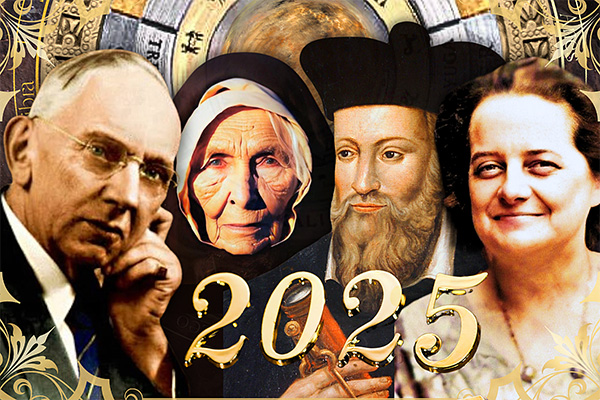Psychic Readings
2025: Psychic Insights For The New Year
 As the final hours of 2024 tick away, the Psychic Access team reflects on the incredible journey we’ve shared with you this past year. To all of our valued clients and supporters, this message comes with heartfelt gratitude and warm wishes as we prepare to enter a new year together.
As the final hours of 2024 tick away, the Psychic Access team reflects on the incredible journey we’ve shared with you this past year. To all of our valued clients and supporters, this message comes with heartfelt gratitude and warm wishes as we prepare to enter a new year together.
The transition into a new year is always a powerful time. It’s a chance to pause and reflect on the lessons we’ve learned and the mistakes we’ve made. Every experience, whether joyful or painful, contains the seeds of wisdom. What did 2024 teach you about yourself? These reflections are not meant to create guilt, but to illuminate the path forward.
The year 2024 was filled with moments of incredible triumph, healing, and self-discovery for many of you, and it has been an honor to be with you every step of the way.
This past year also brought its share of karmic lessons and the overcoming of major setbacks and obstacles. For many, it was a year of intense growth through trial and tribulation — whether in relationships, career, health, finances, or spiritual awakening.
You turned to us for clarity in times of uncertainty, for connection with your guides, angels, ancestors and loved ones, and for divine guidance and spiritual insight to light your path.
Each interaction with you was a sacred exchange, an honor and a privilege, a moment when your courage and openness allowed us to support you in growth, healing and transformation.
Wishing You A Joyful Holiday Season
 Valued clients, as we come to the end of a busy 2024, we want to express our deepest gratitude for your unwavering support throughout another successful year. You continue to inspire us and we are honored to be a part of your personal and spiritual journey.
Valued clients, as we come to the end of a busy 2024, we want to express our deepest gratitude for your unwavering support throughout another successful year. You continue to inspire us and we are honored to be a part of your personal and spiritual journey.
Thank you for the profound impact you have on our team and our work. Your loyalty and trust not only strengthens our resolve, but fuels our passion to continue making a difference. You are the reason for the continued success of our soul circle, and we are deeply grateful to you for being a part of our growth journey.
Through many ups and downs, we have remained committed to being a source of encouragement, healing and guidance throughout the past year. It is our privilege to help you meet life’s challenges, embrace your opportunities, and manifest your highest good. We look forward to continuing to serve you and touching many lives in the years to come.
At this time of year, we are also reminded of the true spirit of the season, which transcends the hustle and challenges of everyday life. It is truly a time to reflect on the extraordinary connections that enrich our lives and to celebrate the kindness, compassion and love that unite us all.
We hope that this holiday season brings you many blessed moments of laughter, joy and heartfelt connection, whether you are surrounded by loved ones or spending time in quiet reflection. If you find yourself alone this season, remember that you are never truly alone. Spirit walks beside you, the Divine protects and guides you, the Universe always has your back, and we are always here for you as part of your chosen soul family.
The Deeper Truth And Wisdom Of Psychic Reading
 A good psychic reading offers more than just clarity and peace of mind — it is also a profound catalyst for spiritual growth.
A good psychic reading offers more than just clarity and peace of mind — it is also a profound catalyst for spiritual growth.
When you have a psychic reading, you and your psychic form a connection on a soul level. This connection feels almost like stepping into another dimension, as you both raise your vibration and access a higher state of consciousness.
This process is both fascinating and mysterious. Often spirit will guide you to a particular psychic, even if you’re not sure why you feel drawn to them. This inner pull is your natural guidance system at work, nudging you toward the person who can provide the insights you need.
The personal issue or life challenge that’s weighing on your mind — whether it’s love, career, business, health, family or friends — is often the key to unlocking a portal of understanding. This portal holds hidden treasures: the spiritual lessons and growth opportunities that await you.
Edgar Cayce, one of the most documented psychics in history, believed that the purpose of psychic readings, or what he called “life readings,” was to provide guidance and insight to help people on their personal and spiritual journeys. He emphasized that these readings provide invaluable information about one’s health and wellness, life purpose, and spiritual growth.
Cayce’s more than 14,000 documented psychic readings often focused on holistic health, addressing the physical, mental, and spiritual aspects of a person’s well-being. He also believed that everyone has the potential to access their own inner guidance and intuition, and that psychic readings could serve as a tool to help us tap into this inner wisdom.
Why Guidance Matters More Than Simple Predictions
 Not all psychic readings are created equal. The difference between a fleeting, superficial chat and a deeply transformative psychic session lies in the level of authentic guidance.
Not all psychic readings are created equal. The difference between a fleeting, superficial chat and a deeply transformative psychic session lies in the level of authentic guidance.
True psychics and mediums offer more than easy answers and simple predictions — they channel insights and guidance that empower their clients to navigate life with more clarity, confidence, purpose and inner peace.
Authentic psychic readings usually include some form of guidance to assist the recipient in their healing, personal growth and spiritual development.
While some people seek out psychic readings for simple predictions and quick fixes, this approach is self-limiting and not recommended. Reputable, ethical psychic readings are also not about simply telling clients what they want to hear.
Gifted psychics and mediums access higher levels of consciousness, universal energies and the spirit realm to offer deeper insights and support the seeker’s unique life path. A psychic reading is an opportunity for exploration, healing and empowerment, designed to illuminate possibilities rather than imply fixed outcomes or provide simplistic solutions to complex matters.
Psychic readings are not about shortcuts; they are about supporting andd enriching your life journey. True psychics help clients grow, learn and evolve through their choices, actions and experiences, rather than bypassing them. Simple, quick answers may provide some temporary comfort, but true empowerment comes from within — through personal and spiritual healing and growth. True psychics help their clients tap into their own inner wisdom, resilience and intuition.
How To Get The Most Out Of Your Psychic Reading
 A reading with one of our talented psychics or mediums can offer you profound insight, guidance, clarity and healing, whether you’re seeking answers to pressing questions, making life decisions or exploring future possibilities.
A reading with one of our talented psychics or mediums can offer you profound insight, guidance, clarity and healing, whether you’re seeking answers to pressing questions, making life decisions or exploring future possibilities.
To maximize the experience, it is good to approach your reading with an open mind, clear intentions, and practical considerations. Here are some tips to ensure a meaningful and enriching session with our expert team of psychic readers:
Choose The Right Psychic
The first step is to find a psychic who will work best with you. Different psychics have different reading styles, specialties, and professional experience. Research their backgrounds, read reviews, and consider recommendations from trusted friends or online communities. A psychic whose style and approach matches your needs will enhance your experience and foster a stronger connection.
At PsychicAccess.com, we make this selection process easier for new clients by providing you with a detailed profile description, an introductory video, and their complete archive of reviews from other clients, as well as a free 6-minute trial reading with an available psychic of your choice. Why do we offer new clients a free introductory reading? Because we know you are going to love the psychics on our team!
Becoming a member of the Psychic Access team is not easy. We are very selective and only accept the best of the best to join our team. On average, only one in eight applicants make it to the interview stage, and out of that short list, only one in twenty are hired to offer readings on our platform.

